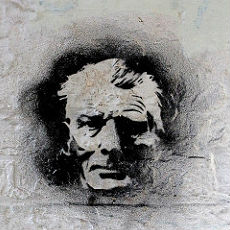I have just finished reading the delightful A Country Road, A Tree by Jo Baker. This is the new fictional account of the writer Samuel Beckett's sojourn through WWII. Knowing he cannot write in the placidity of neutral Ireland, Beckett returns to France and the privations of occupation. However, he can't just write, he has to resist the Germans in any way possible. This puts great strain on his relationship with his lover, Suzanne, who follows him whenever he has to move to stay ahead of the Nazis. Eventually, Beckett realizes that writing is a form of resistance as well. In many ways, WWII made Beckett, causing him to pare down his language and sharpening his world view. Jo Baker's book captures well the hardships of occupied France, with sensual descriptions of food and drink (both in short supply) as well as almost hallucinatory depictions of visual details. Baker also captures Beckett's bewilderment at the fact that his previous facility with language completely breaks down when faced with the horrors of the war. You definitely want to pick up this story of a man becoming himself.
One of the sources Baker credits is Anthony Cronin's Samuel Beckett, subtitled The Last Modernist. While many books about Beckett and his work use a great deal of jargon best left to academics, this one is comprehensible to the average reader. While WWII was the major event in Beckett's life, the rest of it was hardly dull, including encounters with Peggy Guggenheim and James Joyce, whom he worshipped.
Another source is Damned to Fame by James Knowlson, founder of the Beckett Archives. Using previously unavailable papers and interviews with Beckett himself, Knowlson has written an award-winning biography.
Of course, if you don't have time for these two books, there's Beckett in 90 Minutes by Paul Strathern. Once again, jargon-free descriptions of the main themes and plot points of Beckett's work as well as biographical sketches make this a good guide to the master of the absurd in English.
And as for the works of the great man himself? The novels to start with are known are Molloy, Malone Dies, and The Unnamable: Three Novels. Beckett's two seminal plays (among many others) are Waiting for Godot and Endgame.
Got a favorite work among Beckett's voluminous bibliography? Let us know in the comments.



Add a comment to: Meet Samuel Beckett, Master of the Absurd